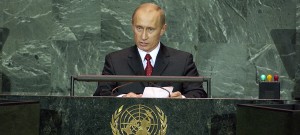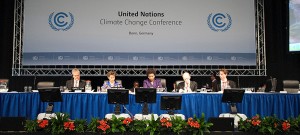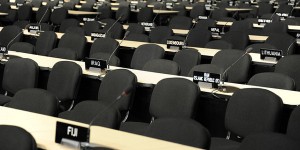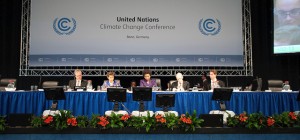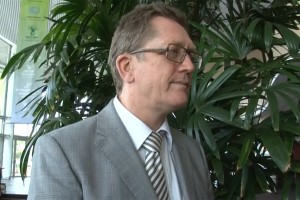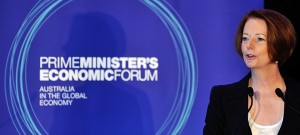Kyoto Protocol
BASIC group make Kyoto II “essential” outcome for progress in Doha
China, India, Brazil and South Africa call on rich nations to sign up for second commitment period and declare ambitious, new emission reduction targets at COP18
Russia rules out taking part in “useless” Kyoto Protocol
Foreign Ministry releases statement explaining that extension will be ineffective and calls for a ‘single document’ of climate obligations
Clean Development Mechanism has now offset emission of one billion tonnes of CO2
UN climate chief Christiana Figueres hails success of Kyoto Protocol carbon trading mechanism, which has now cut global CO2 emissions by a billion tonnes
Analysis: Was enough achieved at UN climate talks in Bangkok?
Edward Cameron and Yamide Dagnet from the World Resources Institute argue that the latest UNFCCC negotiations should be seen as a qualified success – but warn there is much work yet to do.
Canada accused of issuing misleading update on UN carbon cutting progress
Canadian Environment Minister claimed country is halfway to reaching its 2020 targets but a closer inspection reveals it has moved the goalposts.
World’s most vulnerable countries call for greater ambition in Doha to guarantee integrity of Kyoto Protocol
As the Bangkok talks come to a close, the LDCs and AOSIS come together to call on more developed countries to submit legally binding targets for the second commitment period of the Kyoto Protocol ahead of COP18 in Doha.
Russia considers signing up to Kyoto Protocol extension
Russian Deputy Prime Minister says “such a decision has not been taken” on twitter as local reports say the country will sign up to a second commitment.
Bangkok 2012: Talks offer first glimpses of what Kyoto Protocol MK2 might look like
Discussions on Kyoto progress with the potential for three new members, retributions for those who don’t sign and ongoing questions surrounding the scale of emission cuts country’s are promising.
Bangkok 2012: Civil society react to latest round of UN climate talks
Reaction to UNFCCC negotiations from Greenpeace, WWF, Christian Aid, Practical Action, Third World Network, Union of Concerned Scientists & Environmental Defense Fund
Bangkok 2012: UN climate talks close with ‘unofficial’ draft on Kyoto Protocol 2nd period
Progress on several issues builds momentum ahead of Doha summit but questions remain on climate finance, the ambition of emission pledges and the tricky LCA track of negotiations.
Bangkok 2012 – Lead EU negotiator Runge-Metzger says a 30% emission reduction target is still possible
Other key countries must raise ambition too but timing of US elections means crucial decision in Washington unlikely in time for Doha talks.
Bangkok 2012 – LDC chief confident Australia will sign up to Kyoto Protocol extension
Julia Gillard’s government is close to signing up to the second commitment period of the Kyoto Protocol (KP2), a leading negotiator at the UN climate talks in Bangkok has told RTCC.
Bangkok 2012 – Poorest nations issue plea for support in climate battle while richest accused of watering down ambition
EU, Australia and New Zealand signal less ambition and more flexibility with pledges while least developed countries reiterate need for financial and logistical help to fight climate change at home.
Bangkok 2012 – Rich countries must not dump their responsibilities on the poor says NGO
Third World Network says developed economies must take responsibility for their historical emissions with ambitious targets to cut greenhouse gases.
Bangkok 2012 – Loose ends and few surprises at first day of UN climate change talks
Meeting in Bangkok kicks-off with familiar battle lines drawn on Kyoto Protocol and early salvos fired on new global deal.
Bangkok 2012 – Forests: The make or break for New Zealand and Kyoto II
Forestry is likely to be a key point of interest for New Zealand heading into the Bangkok talks as the country’s ability to meet their Kyoto targets is dependent on the sector.
Australia joins EU carbon trading scheme boosting its credentials as a climate change tool
Expanding emissions market sends positive signals for future international carbon cuts but analysts warn it is no quick fix for troubled system.
Australia’s acute water shortages mapped
Projected Australian water shortages suggest governments of future will have to ration water between mining, agriculture and major cities.
Rio+20: Five climate change ideas that didn’t make the Earth Summit outcome
While proposals in the final text were weak, some important ones didn’t even make it into the document. RTCC looks at five ideas for climate change action that didn’t make the grade.
New Kyoto climate change targets proposed for rich countries
Submission by the Alliance of Small Island States (AOSIS) would more than double the EU target and set Australia a goal to cut CO2 by 7%.
